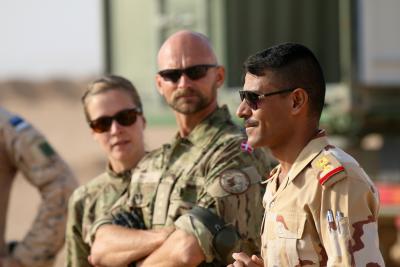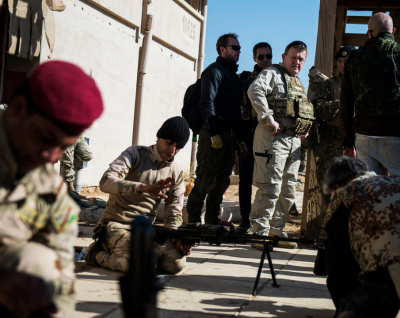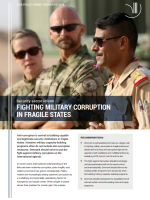Fighting Military Corruption in Fragile States

■ The fight against corruption should be strategic and comprehensive both at the country level and internationally. Denmark should draw on its existing whole-of-government structures when formulating military capacity-building programs.
■ Denmark should incorporate the establishment of anti-corruption units into existing train-and-equip programs.
Anti-corruption is central to building capable and legitimate security institutions in fragile states. However, military capacity-building programs often do not include anti-corruption measures. Denmark should strive to put the fight against military corruption on the international agenda.
In recent years, international understanding of the links between endemic corruption, state fragility and violent extremism has grown considerably. Policymakers are increasingly seeing systemic corruption as a mobilizing and potentially radicalizing factor for insurgency and social unrest. When people in power abuse their position for private gain, this createsdeep-seated grievances of repression, injustice and exclusion. Drawing in particular on lessons from Afghanistan and Iraq, it has also become clear that the influx of resources from international actors may inadvertently exacerbate systemic corruption and thus jeopardize the wider objectives of the engagement.
The problem is particularly acute in relation to security assistance. First, this is because it deals directly with institutions that are instrumental in state repression, like the army and the police. Secondly, it tends to involve substantial financial and material resources, including arms. For this reason, it is pivotal that efforts aimed at building up security forces are designed to curb corruption, otherwise there is a very real risk that the assistance will turn out to be counter-productive.
However, more often than not, and especially in situations of ongoing conflict, military capacitybuilding programs are formulated and implemented without the inclusion of explicit anti-corruption measures. For reasons of expediency, the emphasis is placed on short-term train-and-equip activities that may strengthen the immediate military capabilities of the national security forces, yet which fail to address wider systemic shortcomings.
Corruption has a direct negative impact on the operational effectiveness of the trained forces
The dilemma between short-term security imperatives and long-term development needs is well-known to both policy-makers and practitioners. What is onlygradually being understood, however, is that, when it comes to military corruption, the dilemma is a false one: in highly corrupt environments, training and equipping soldiers will not produce effective national security forces that can fight insurgents, maintain law and order, and otherwise maintain national security. Corruption has a direct negative impact on the operational effectiveness of the trained forces. If, for instance, those of higher rank grab resources earmarked for the salaries and food of ordinary soldiers, the risk of desertion will increase dramatically, as has been witnessed in both Iraq and Afghanistan.
■ Sanctioning individuals at the higher levels by for instance holding back their visas or restraining possibilities for international financial transactions work as means to fight corruption, in so far as elite figures tend to be concerned with their freedom to buy and travel internationally.
■ In Colombia, the Secretary General of the MoD initiated greater transparency measures in public contracts and procurement. If a given contract were to be held secret, it had to be approved by the SG personally and was considered a matter of national security. After a few years, the number of secret procurements dropped dramatically, showing the importance of high authority involvement and willingness to follow through.
■ In Guatemala, CICIG (International Commission against Impunity 2006) went after individuals who had been implicated in corruption and human rights abuses and prosecuted these. This sent an important signal to society as a whole that CICIG was serious, and it built up credibility. It also showed that sanctions based on prosecutions and investigations can have preventive effects.
■ Recently in Afghanistan, ISAF withheld 10% of funds in order to sanction the lack of efforts to clamp down on salaries to 50,000 ghost soldiers. This has had an immediate effect and may prove that if international forces are willing to prioritize anti-corruption and apply targeted conditionality measures, this may yield results.
Clearly, military capacity-building programs cannot in and of themselves address the deeper structural, systemic factors that foster corruption. However, if security assistance programs are pursued in isolation from wider anti-corruption efforts, they can effectively undermine and subvert the success of these efforts. A comprehensive approach is needed to fight corruption effectively. Often, however, the anti-corruption agenda is left to development agencies alone. For a number of reasons, development actors prefer to work with civilian institutions and oversight mechanisms in, for example, parliament and civil society. Vital as these activities are, they do not address the problem of military corruption head on. As a result, an important opportunity to mobilize the necessary political will to fight corruption in the security sector is lost on the part of both host nations and donor governments. This further underlines the importance of integrating the fight against corruption into efforts aimed at building military capacity.
Opportunities and ways forward
Despite the many challenges involved in anticorruption efforts, there are important insights that can be drawn from past experience and situations where some progress has been achieved.
From the outset, international actors need to appreciate that the security sector is the most important to reform, yet also one of the most difficult. The focus on regime survival and the culture of secrecy surrounding national security hinder access for outsiders. This indicates that anti-corruption measures should be viewed not as a purely technical and procedural issue, but rather as a deeply political challenge that reflects the underlying relations between the political, military and economic structures in the country. It also shows why it is futile to seek to address everything at once.
The pushback from within will most likely be overwhelming. In order to stand a realistic chance of reforming corrupt systems that work to the advantage of people in power, it is often better to build up initiatives gradually, starting with one little piece in one sector. At the same time, however, it is pivotal to signal clearly to both ordinary people and those in power that the fight against corruption is also targeting individual leaders and networks that prosper from it, even if, and when, this involves going after national partners. Otherwise the sincerity and commitment of international actors will be all too easily discredited.
Even in states where there is little capacity or political will to engage in wider anti-corruption programs, baby steps can be taken, for instance, by setting up joint committees to analyse, map and monitor corruption. Opening up a space for talking about corruption may help nurture a better mutual understanding and greater political will to address the issue.
On the whole, however, it is crucial that efforts to tackle corruption are based on a thorough understanding of the specific context. There is no one-sizefits-all solution to countering corruption while building up military capacity. In order to acquire such understanding, it can be helpful to draw on studies of the country’s political economy and overviews of its history of conflict. To identifyproblems in the security sector specifically, a growing range of indexes assessing specific issue areas are now available, for example, from Transparency International. Such indexes may point out how a given country performs relative to other countries in the region: for instance, are the salaries paid to the security forces disclosed to the public and paid on time, are the military engaged in the exploitation of natural resources, and is there oversight of appointments to sensitive positions? Often, it is necessary to supplement these open sources with intelligence on specific individuals and networks in order to identify both the thorny issues involved and the low-hanging fruit.

In short, anti-corruption initiatives must be based on comprehensive, strategic approaches that bring together all elements of international engagement, including military capacity-building, and apply them variously as sticks and carrots to push for reforms. This, however, requires donor governments prioritizing the fight against corruption, as well as needing strong political will and determination.
A video recording of the seminar is available at: www.diis.dk/node/23420
DIIS Experts



